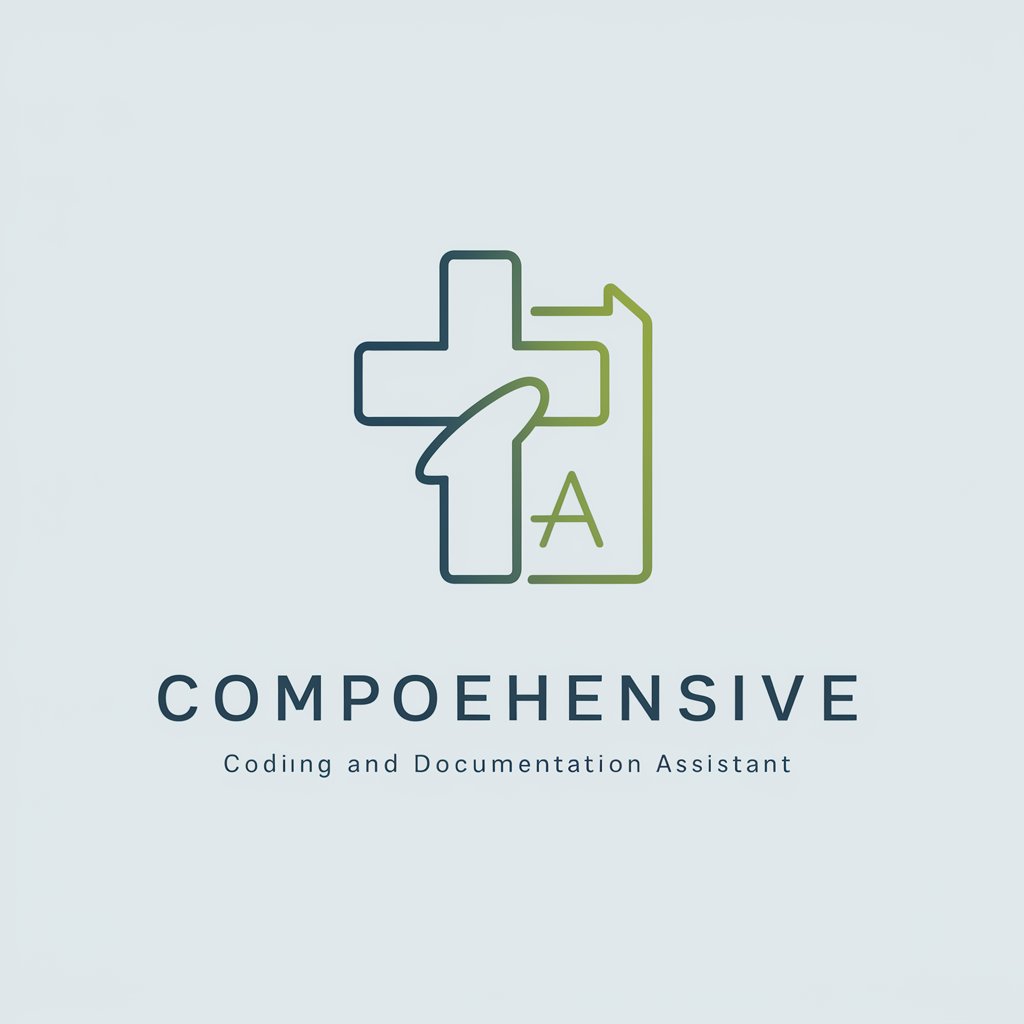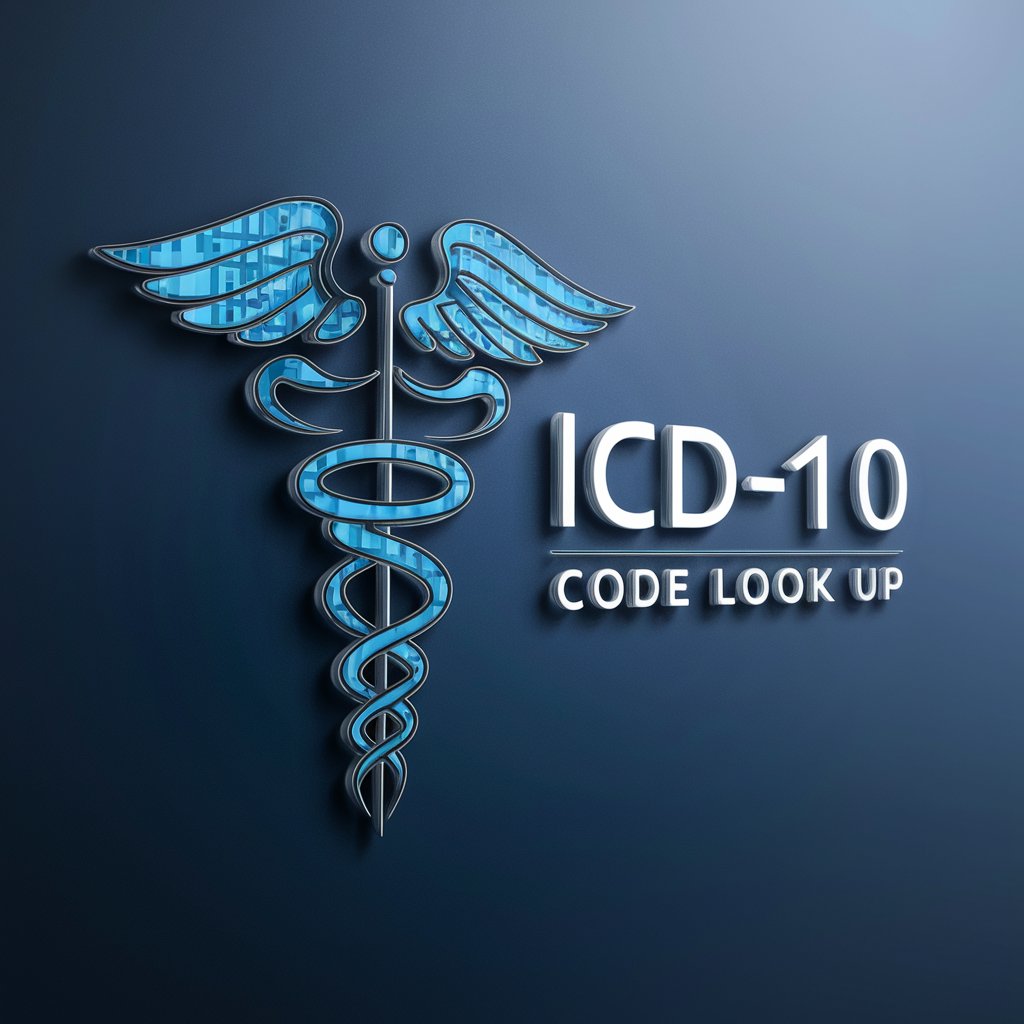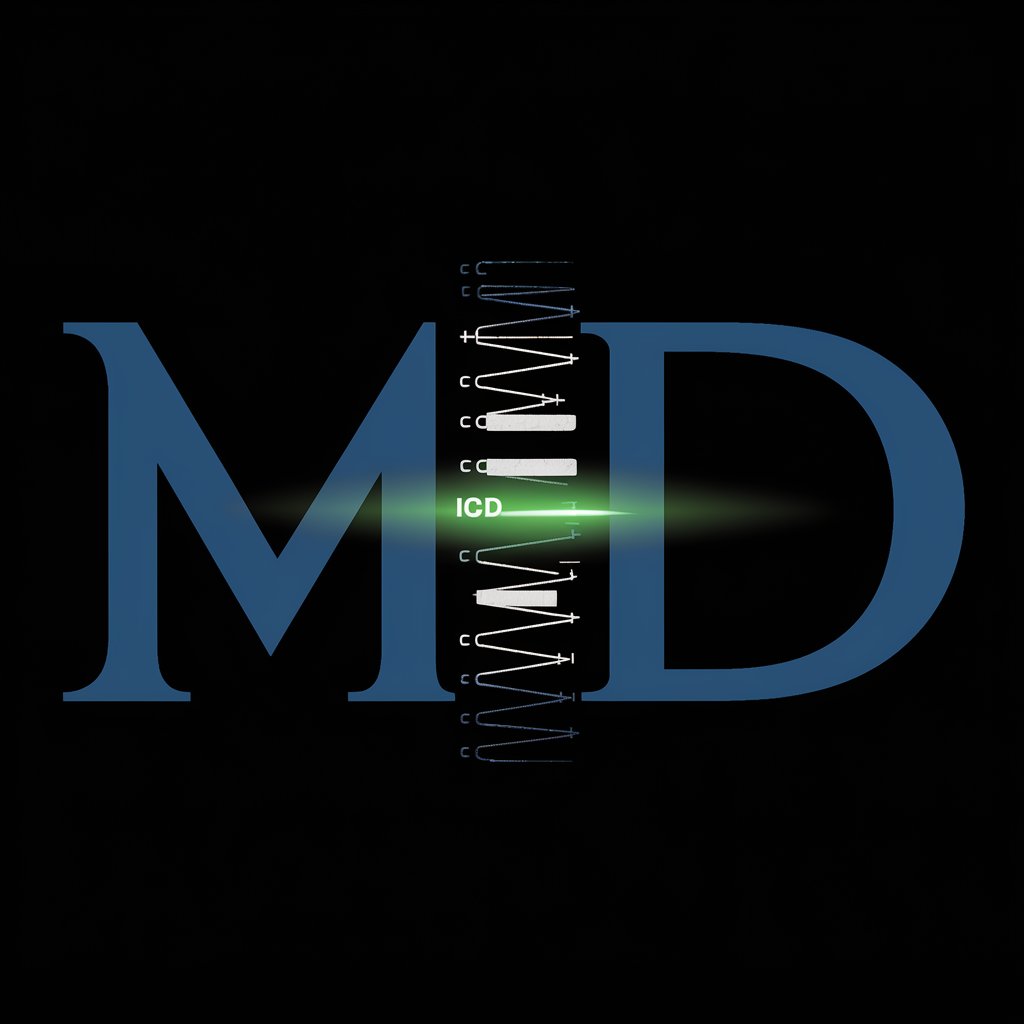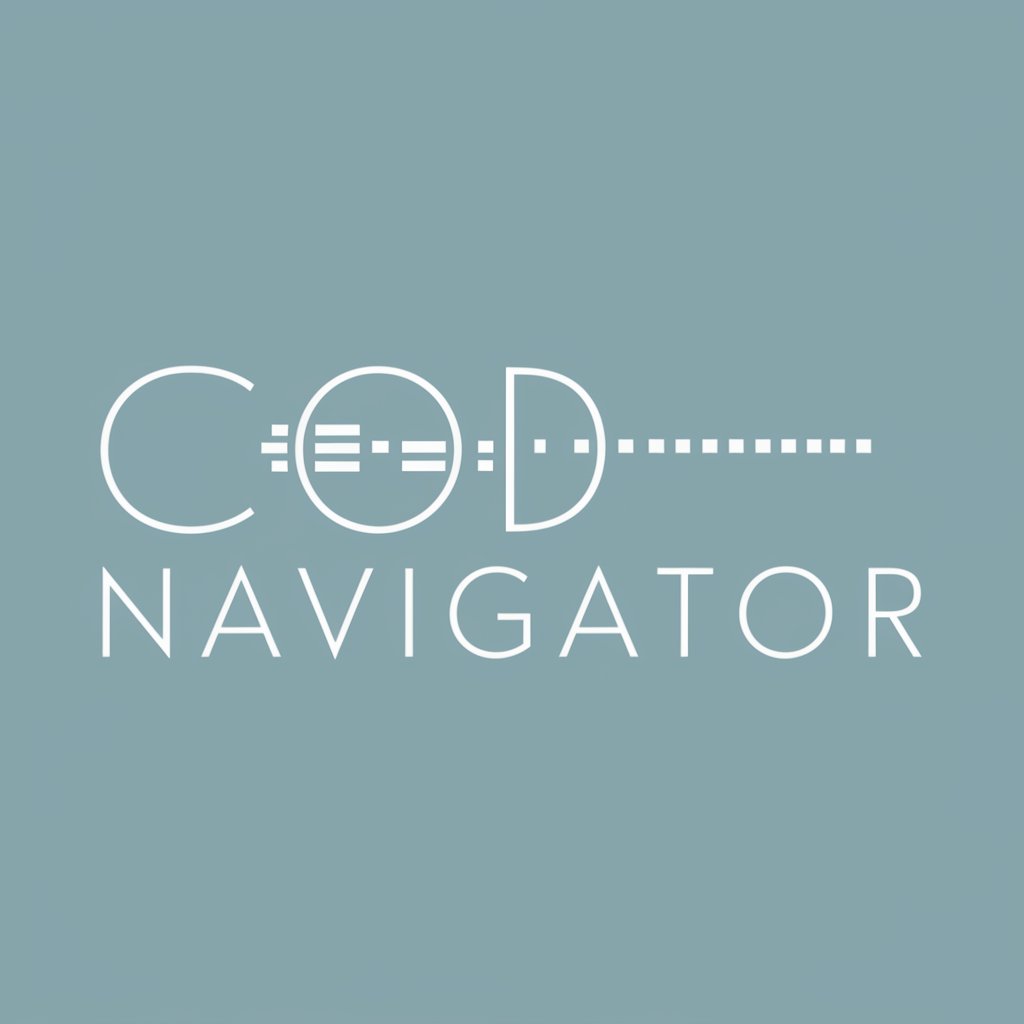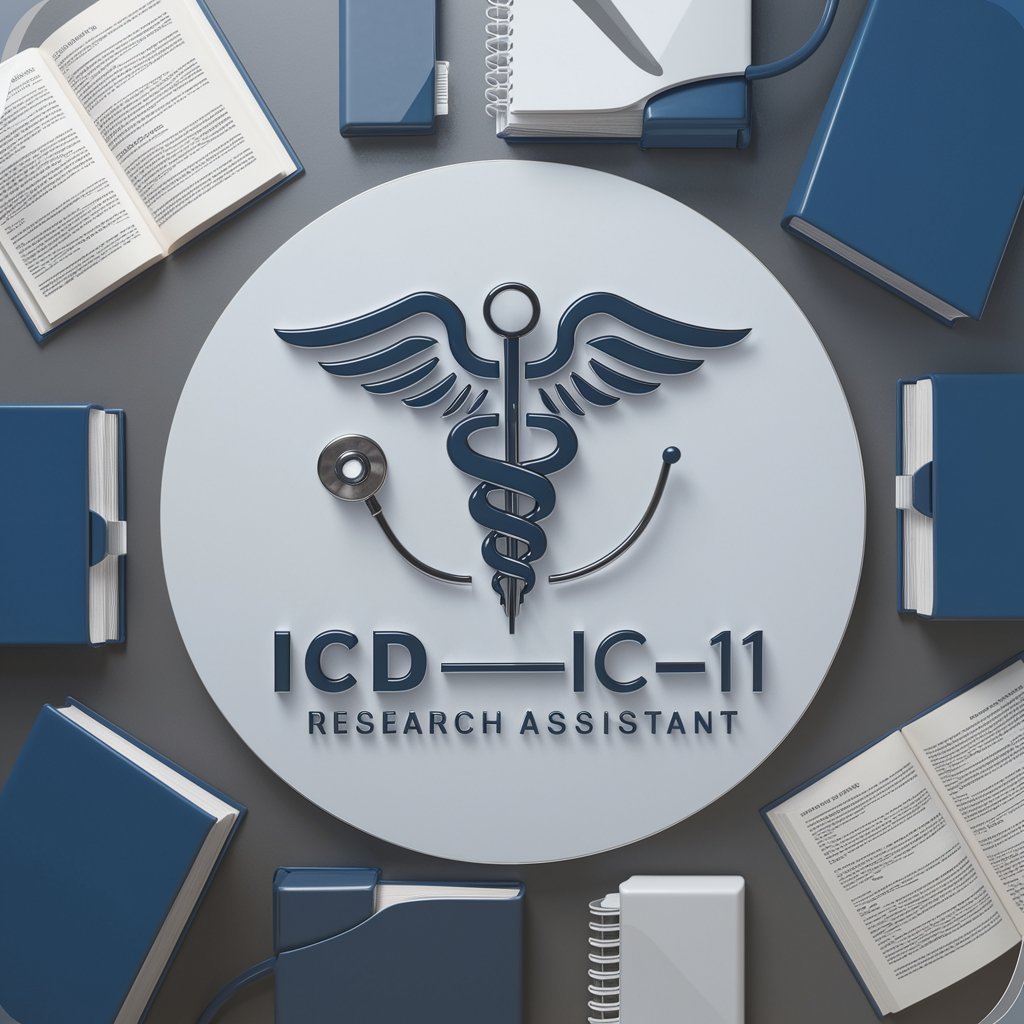
ICD-10 Codes Wizard - ICD-10 code lookup and guidance

Helps with ICD-10 coding and understanding codes. Information from Centers for Medicare and Medicaid Services.
AI-powered tool for quick ICD-10 coding
What's the ICD-10 code for...
How do I code a procedure in ICD-10?
Explain the ICD-10 coding for...
Difference between two ICD-10 codes?
Get Embed Code
Introduction to ICD-10 Codes Wizard
The ICD-10 Codes Wizard is a specialized tool designed to assist healthcare professionals, medical coders, and billing specialists in navigating the complex landscape of the International Classification of Diseases, 10th Revision (ICD-10). This system of codes is used worldwide to document diagnoses, conditions, and various medical situations, playing a critical role in healthcare management, billing, and data analysis. The ICD-10 Codes Wizard focuses on streamlining the coding process, ensuring accuracy, and enhancing efficiency. By providing detailed information, guidance, and clarification on the application of specific ICD-10 codes, it simplifies the process of finding the right codes for a wide range of medical scenarios. For example, a healthcare professional managing a patient with a new diagnosis of Type 2 diabetes might use the ICD-10 Codes Wizard to quickly find the relevant code, such as E11.9 (Type 2 diabetes mellitus without complications). The Wizard not only supplies the code but also offers related codes for complications or comorbid conditions, ensuring comprehensive documentation. It is designed to adhere to the latest ICD-10 guidelines and standards, referencing authoritative resources like the CMS ICD-10 guidelines to provide up-to-date, accurate coding information. Powered by ChatGPT-4o。

Core Functions of ICD-10 Codes Wizard
ICD-10 Code Lookup and Guidance
Example
A primary care physician is uncertain about the correct ICD-10 code for a patient's acute sinusitis. The Wizard can provide the code J01.90 (Acute sinusitis, unspecified) along with explanations about when to use specific sub-codes based on sinusitis type and severity.
Scenario
In a busy clinical setting, a medical coder uses the Wizard to verify codes for several conditions in a patient's chart, ensuring the selected codes align with the patient's diagnoses and comply with current coding guidelines.
Coding Clarification and Updates
Example
A billing specialist encounters a denial due to outdated coding. The Wizard helps by referencing the latest ICD-10 updates from CMS, ensuring the use of correct codes, and providing detailed explanations if changes have occurred.
Scenario
In a cardiology practice, staff use the Wizard to stay informed about changes to cardiovascular-related ICD-10 codes, ensuring compliance with the latest documentation requirements for reimbursement.
Specialty-Specific Coding Assistance
Example
A pediatrician looks up the appropriate ICD-10 code for a child presenting with symptoms of asthma. The Wizard provides codes specific to pediatric asthma, such as J45.909 (Unspecified asthma, uncomplicated), and suggests related codes if the condition includes an exacerbation.
Scenario
In an orthopedic clinic, coders use the Wizard to find precise codes for various fractures, like S72.001A (Fracture of unspecified part of neck of right femur, initial encounter for closed fracture), ensuring detailed documentation for insurance claims.
Educational Resource for Coding Guidelines
Example
A newly hired medical coder uses the Wizard to learn how to code complex conditions like hypertensive heart disease. The Wizard explains the necessary combination codes (e.g., I11.9 for Hypertensive heart disease without heart failure) and any sequencing rules that need to be followed.
Scenario
During a training session, coders use the Wizard to review the official coding guidelines for sequencing multiple diagnoses, ensuring that primary and secondary conditions are documented correctly on claim forms.
Target User Groups for ICD-10 Codes Wizard
Medical Coders
Medical coders are one of the primary users of the ICD-10 Codes Wizard. They benefit greatly from the tool's ability to streamline the coding process, provide clear guidance on selecting the most appropriate codes, and ensure compliance with the latest ICD-10 updates. This tool helps them accurately capture patient diagnoses and conditions for billing and documentation purposes, minimizing the risk of errors and claim denials.
Healthcare Providers (Physicians, Nurses, etc.)
Physicians and other healthcare providers use the Wizard to quickly find the correct ICD-10 codes for their patient's conditions, enhancing the quality of clinical documentation. By ensuring that all relevant diagnoses are coded accurately, healthcare providers can support better patient care management and facilitate the billing process.
Billing Specialists
Billing specialists rely on the ICD-10 Codes Wizard to verify and cross-check diagnosis codes before submitting insurance claims. This ensures that claims are processed correctly, reducing the likelihood of denials due to coding errors. The tool's detailed guidance helps them understand how specific codes affect billing and reimbursement.
Healthcare Administrators
Administrators in healthcare settings use the Wizard to ensure their coding teams are up-to-date with the latest ICD-10 guidelines. This helps maintain compliance, improves the accuracy of health records, and maximizes reimbursement. The Wizard's ability to provide coding education and clarification supports administrators in implementing proper documentation practices within their organizations.

How to Use ICD-10 Codes Wizard
Visit yeschat.ai for a free trial without login.
Access the ICD-10 Codes Wizard directly on yeschat.ai, where you can start using the service without the need for login or a paid subscription, such as ChatGPT Plus.
Input your medical condition or diagnosis.
Enter the medical condition, diagnosis, or any relevant details about the case. The tool will use this input to generate accurate ICD-10 codes based on the latest standards.
Review the suggested ICD-10 codes.
Receive a list of relevant ICD-10 codes and descriptions that match your query. These codes adhere to the latest coding guidelines and standards set by CMS.
Refine your query if necessary.
If needed, adjust your query or add additional clinical details to get more specific or alternative ICD-10 code suggestions.
Use coding guidelines for accurate billing.
Refer to the official CMS coding guidelines and use the provided ICD-10 codes to assist in medical billing, documentation, or case review.
Try other advanced and practical GPTs
Arquitecto Virtual GPT
AI-driven designs for custom architecture

Succint
AI-powered tool for precise answers

Tinder dating app responder
AI-Powered Dating Conversations Made Easy

Akustik Eksperten
Optimize Your Sound with AI
EBM SEARCH
AI-powered insights for evidence-based medicine

AI Movie Maker
Craft your script with AI precision

Alternate History Storyteller
AI-powered alternate history exploration

Magnific AI
Enhance and upscale your images with AI

Book Book Book
AI-powered guide to essential reading

Network Engineer GPT
AI-powered network and security solutions

Student of Operations and Supply Chain Management
AI-powered tool for operations students.

Delta Virtus
AI-powered assistance for legal processes.

FAQs about ICD-10 Codes Wizard
What does the ICD-10 Codes Wizard help with?
The ICD-10 Codes Wizard assists medical professionals and coders in quickly identifying accurate ICD-10 codes for diagnoses, procedures, and medical conditions. It simplifies the coding process and ensures compliance with the latest guidelines.
Is a subscription required to use ICD-10 Codes Wizard?
No, the ICD-10 Codes Wizard is accessible without a subscription or login, and there is no need for a paid plan like ChatGPT Plus. You can start using it for free on yeschat.ai.
How up-to-date are the ICD-10 codes provided?
The ICD-10 Codes Wizard uses the latest coding guidelines and databases, including updates for the current fiscal year, ensuring that all suggestions are compliant with CMS standards and regulations.
Can ICD-10 Codes Wizard handle complex medical queries?
Yes, the tool can handle a wide range of medical conditions, from general diagnoses to more complex and specialty-specific cases. It provides relevant codes and explanations for each query.
What are some typical use cases for ICD-10 Codes Wizard?
Common use cases include assisting in medical billing, coding audits, case reviews, and documentation for healthcare providers across specialties such as internal medicine, pediatrics, orthopedics, and more.
